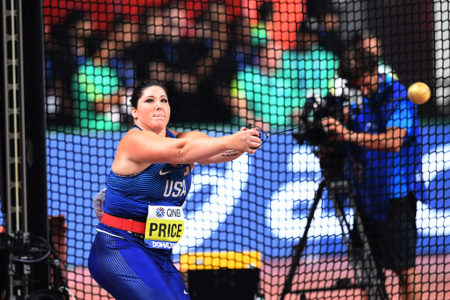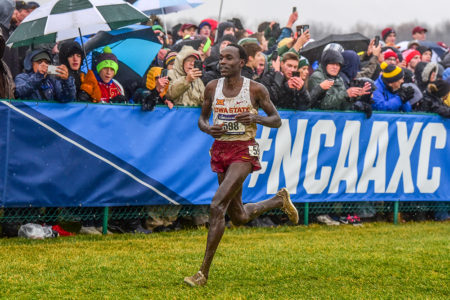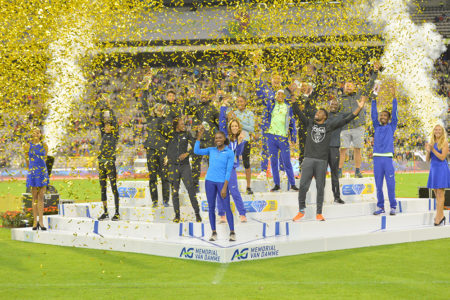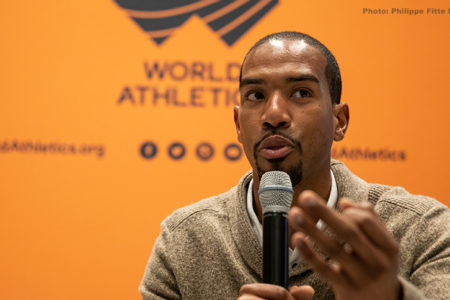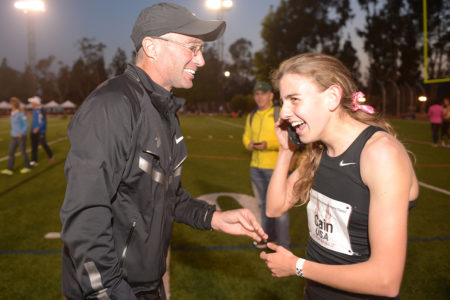
IN RECENT YEARS the name Mary Cain was often part of the question, “Whatever happened to…?” But on November 7, it became part of one of the biggest stories to ever explode past the confines of the running world and into mainstream awareness. The one-time prep phenom, now 23, told the world exactly what happened to her in a New York Times opinion video entitled, “I Was The Fastest Girl In America, Until I Joined Nike.”
In the video, Cain didn’t pull any punches about her relationship with running guru Alberto Salazar and his position with the Nike Oregon Project. After briefly detailing her bright early years in the sport, she said, “I joined Nike because I wanted to be the best female athlete ever. Instead, I was emotionally and physically abused by a system designed by Alberto and endorsed by Nike…
“When I first arrived, an all-male Nike staff became convinced that in order for me to get better, I had to become thinner and thinner and thinner. This Nike team was the top running program in the country and yet we had no certified sports psychologist, there was no certified nutritionist. It was really a bunch of people who were Alberto’s friends. So when I went to anybody for help they would always just tell me the same thing, and that was to listen to Alberto.
“Alberto was constantly trying to get me to lose weight. He created an arbitrary number of 114 pounds [52kg] and would usually weigh me in front of my teammates and publicly shame me if I wasn’t hitting weight. He wanted to give me birth control pills and diuretics to lose weight—the latter of which isn’t allowed in track & field. I ran terrible during this time. We reached a point where I was on the starting line and I’d lost the race before I started because in my head all I was thinking of was not the time I was trying to hit but the number on the scale I saw earlier that day.”
Cain went on to talk about the risk of developing Relative Energy Deficiency in Sports (RED-S) that comes with that kind of weight loss, and reveals that she lost her period for 3 years. “When you are not getting your period, you’re not gonna be able to have the necessary levels of estrogen to maintain strong bone health. And in my case, I broke 5 different bones.”
Cain’s account gets even darker: “The New York Times Magazine published a story about how Alberto was training me and nurturing my talent. We weren’t doing any of that. I felt so scared. I felt so alone. And I felt so trapped and I started to have suicidal thoughts. I started to cut myself. Some people saw me cutting myself and nobody really did anything or said anything.”
Eventually—after a ’15 race where Salazar yelled at her that she was too heavy—she revealed to him and the Nike sports psychologist that she had been cutting herself. “They pretty much told me that they just wanted to go to bed… For me that was my kick in the head where I was like, ‘This system is sick.’”
Cain was finally able to open up to her parents about the situation and was soon home: “I wasn’t even trying to make the Olympics anymore. I was just trying to survive. So I made the painful choice and I quit the team.”
She notes that though the NOP was shut down and Salazar received a ban, that was a result of USADA’s doping investigation (which had nothing to do with her): “They’re not acknowledging the fact that there is a systemic crisis in women’s sports and at Nike where young girls’ bodies are being ruined by an emotionally and physically abusive system.”
She closed by calling on Nike to change, and for more women to be brought into leadership and support positions throughout the sport.
Cain’s message didn’t cause just ripples in the sport; it created tidal waves. As of the end of November, more than 6 million people have viewed the video. Suddenly it seemed as if it was the only thing runners were talking about. Nike followed up with a statement promising an internal investigation. Cain has asked for a third-party investigation, something Nike has not responded to.
Salazar apologized to a reporter, sort of, saying, “If I was callous or insensitive, I’m sorry.” He also denied her charges that he encouraged unhealthy weight loss. He added, “Mary’s father is a medical doctor, and both of her parents were deeply involved in her training, competition and health throughout the period she was coached by me. For example, Mary’s father consulted on medications and supplements Mary used during her time at the NOP. Neither of her parents nor Mary raised any of the issues that she now suggests occurred while I was coaching her. To be clear, I never encouraged her, or worse yet, shamed her, to maintain an unhealthy weight.”
Salazar also released a text that Cain sent him last April saying that she was “excited to be working together again.” But, she clarified to Runner’s World, after the story broke, “When we let people emotionally break us, we crave their approval more than anything. I was the victim of an abusive system, an abusive man. I was constantly tormented by the conflict of wanting to be free from him and wanting to go back to the way things used to be, when I was his favorite.”
A number of Cain’s former teammates chimed in to refute Salazar’s denial of weight-shaming, saying that they had witnessed this aspect of the NOP in action. Amy Yoder Begley tweeted, “After placing 6th in the 10,000m at the 2011 USATF Championships, I was kicked out of the Oregon Project. I was told I was too fat and ‘had the biggest butt on the starting line.’ This brings those painful memories back.”
Olympian Kara Goucher added, “I have stories to match all of Mary’s claims and so much more.”
Said Shalane Flanagan, stalwart of the Bowerman TC, not the NOP, “I had no idea it was this bad. I’m so sorry, @runmarycain that I never reached out to you when I saw you struggling. I made excuses to myself as to why I should mind my own business. We let you down. I will never turn my head again.”
In a long Twitter thread, coach Steve Magness, who used to work with the NOP, shared his memories: “It was part of the culture. As I listened to Mary Cain speak, it all resonated. Salazar was obsessed with weight. He’d ‘joke’ about using liposuction or removing your appendix for weight loss…”
For her part, Cain is not backing down, and has single-handedly increased awareness of what is a troubling side of the sport. Recently graduated from Fordham, she says she plans to continue running. As for her role as an advocate for women in the sport, she says she is going to “take one day at a time.” ◻︎
